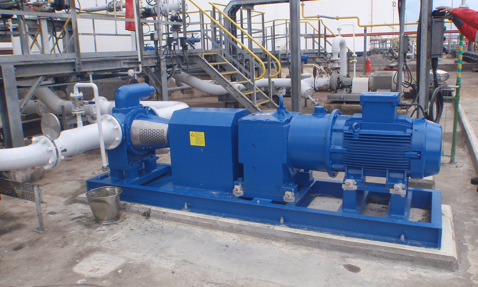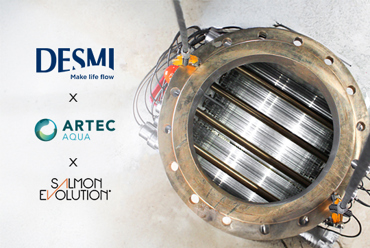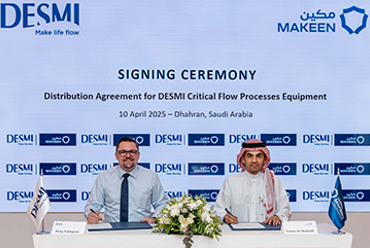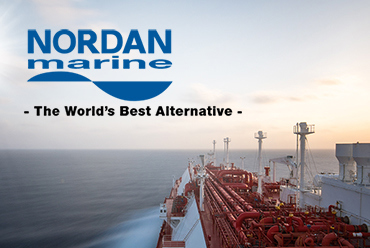
May 2025

September 2016
When you’re running a dockside petroleum liquid products, chemicals and LPG/LNG or multiple bulk liquids terminal, your reliability as a supplier – and the ability to win repeat business – is heavily reliant on the quality of the fluid-handling equipment and pumping systems on hand.

Reliability rules
For terminal operators, reliable handling and high transfer speeds are critical for dockside transfer, bunkering and re-distribution of petroleum fluids, oil and liquid chemicals, fuel oils and other bulk liquids.
“Energy-savings are important, certainly, but the first priority for storage terminal operators is the system’s loading and unloading speed and its reliability,” says Mr. Jimmy Ng, DESMI Singapore’s General Manager. “Operators must deliver customer-stored products to specific destinations on time and avoid port delay costs or contract penalties, for example, so a very stable pump throughout the whole operation is crucial.”
Rotary pumps, such as those produced by Danish-based industrial pump manufacturer DESMI under the brand name ROTAN®, are an excellent means of doing this. ROTAN® pumping systems can transfer up to 250m3 per hour for a wide range of fluid materials, so they’re ideal for loading into road tankers, ISO road tank containers or small vessels, and for drumming. Typical applications include oil and chemical transfer, often for distributed bunkering, and bitumen transfer.
Oil or chemical cargo coming from crude tankers is usually pumped into storage tanks on land using the shuttle tanker’s pumping systems. From there, the oil is then transferred to a road tanker or an ISO road tank container, trunk-routed or drummed. Some terminal operators transport oil or chemicals for drumming at a one-stop warehousing service partner. Bitumen terminals, on the other hand, receive, store and transfer raw product for asphalt. The bitumen arrives on larger-capacity ships, and is usually then pumped into storage tanks before being re-pumped to road tankers for distribution to mixing stations around the country.
In the past, terminal operators preferred to operate specialised pumps for each application. Now, the tendency is to use a single pump for multiple functions. DESMI has answered this relatively new need by incorporating, for example, a frequency inverter with system control devices such as meters, sensors and gauges, enabling pump speed to match the variable flow and variable system operating pressure, as well as the variable viscosities of pumped fluids. Naturally, working with a variety of bulk liquids can be tough on pumps, but it also demands more of the terminal operator’s staff, too.
DESMI’s edge in the market for industrial pumps isn’t just the pumping equipment itself. Instead, the company’s technical knowledge has proven a valuable asset to winning orders and keeping things running smoothly once everything has been installed.
“You need to know about pumping systems, processes and operations,” says Mr Ng. “Achieving the best results demands awareness of all operational aspects, including the challenges and the impact on the pump of each operational mode – whether it’s loading ships or trucks, drumming, stripping to completely empty the storage tanks, or tank clearing. Almost every order we get is backed by solution selling – the ability to knowledgeably discuss with the customer, the operator and the maintenance guy not just the pump itself but the entire operation. Some units are used for handling different grades and viscosities of petroleum oil with huge differences in operating conditions and expectations, so you need to understand the whole picture – will the specified pumps and accessories be able to meet the complete operational expectations? And where are the strengths and weaknesses in relation to the entire operation requirements?”
DESMI in demand
DESMI’s pumps are widely used all over the world. One customer, for example, operates a wide portfolio of oil and petroleum products terminals in many parts of the world. In Singapore, with its status as a key international cargo hub, the operator’s terminals support chemical and oil companies, trading companies, and national oil companies. Various DESMI pumping systems are installed at these terminals, handling different types of transfers depending on the functions of the terminal and the demands of specific contracts the operator signs with its customers.
In Vietnam, DESMI pumps keep things moving at a major bitumen marketer that imports, stores and distributes asphalt for road building and infrastructure developments in the country. The marketer’s terminal at Haiphong boasts wharf facilities with a state-of-the-art bitumen storage terminal and a capacity of 5,000 metric tons. The company is one of two large bitumen companies using DESMI equipment in Vietnam. DESMI pumps are also installed at the bulk liquid terminals of Indonesian-based customers.
The knowledge loss problem
“The type of products and operations determines the pumping system required,” Mr Ng explains. “Typically, a terminal operator will sign a three- to five-year contract based on existing facilities, or will turn to someone like DESMI to provide an appropriate pumping system that meets contract needs – and that’s where having a good relationship to the pumping solution supplier really makes a difference.”
To achieve a reliable, ready-for-action pumping system, you need to have operational staff who are familiar with the equipment and able to adjust the various operational parameters required to ensure optimal flow. In Singapore, many of the equipment operators in bulk oil terminals are contracted workers with little knowledge of handling pumping equipment. They have limited operational experience, a narrow understanding of the overall pumping system and terminal operation, and are typically under time pressure. It’s important, therefore, to choose pumping equipment and solutions from a supplier that can offer the technical support – and application know-how – to operate an efficient storage terminal.
Rapid repair
DESMI’s pumps feature another key advantage that is closely related to the ability to quickly recover from mechanical failure, restoring the pumps back to operation with minimal down-time.
“The heaviest part of a ROTAN® pump is the ‘pump casing’,” says Mr Ng. “DESMI casts the foot of all its pumps on the casing. On the one hand, this provides extra strength to withstand any stress from piping misalignment or system loads and reduces vibration. On the other, it means you don’t have to remove the casing for repair or servicing if required. When installed with a space coupling, for example, the rotating assembly can easily be removed from the casing for inspection or repair without disturbing the piping, pump casing or coupling alignment. So customers can keep a few key components on hand that can be quickly swapped out without needing a highly skilled technician.”
Such rapid repairs are particularly important for liquids such as bitumen, which can’t be allowed to cool down within the pump for long. Bitumen is a product that DESMI’s technical advisors know inside and out, and the company’s team typically spends a great deal of time talking to the bitumen plant’s end-user, discussing typical challenges faced, and constantly exploring new ways to improve performance and reliability. DESMI encourages its pump distributors to take the manufacturer’s representatives along to customer meetings, helping to bring both depth and breadth of application and product know-how closer to the customer.
Know-how beats price
As could be expected, falling oil prices have had an impact on operator’s willingness to pay for premium equipment. The equipment pricing remains an important part of the overall picture but there are many others important factors need to be considered as well when chosen of pumping equipment supplier,
“At the end of the day, know-how and good service support to the customer is what sells the solution,” Mr Ng explains. “Once customers start to understand the full picture of high-quality pumping solutions and service support and perhaps inviting the customer for a visiting trip to our factory or visit to other operators’ terminals to hear the good success stories of DESMI Pumping Solution, it’s relatively easy for them to realize the extra value they’re getting.”


May 2025

May 2025

April 2025

February 2025